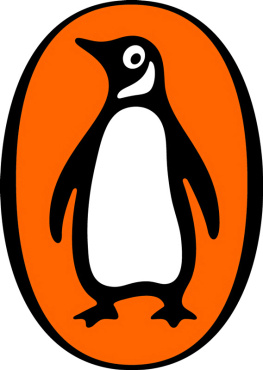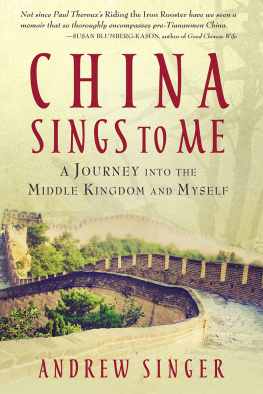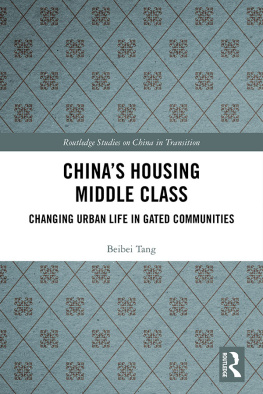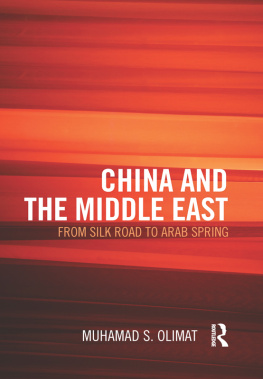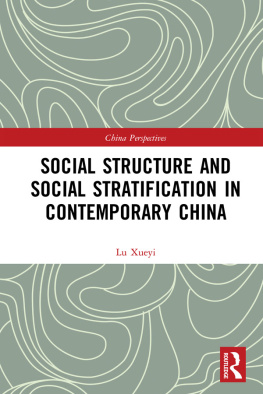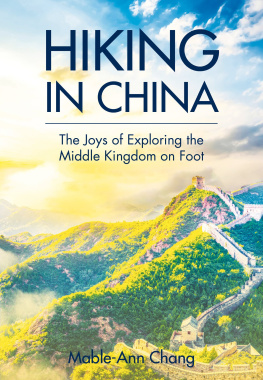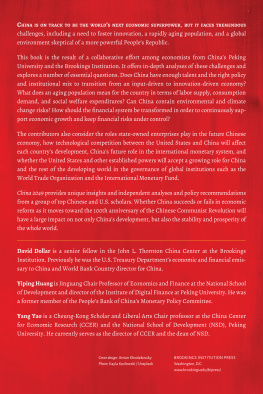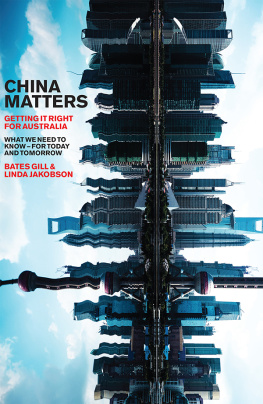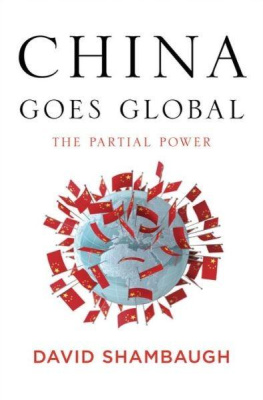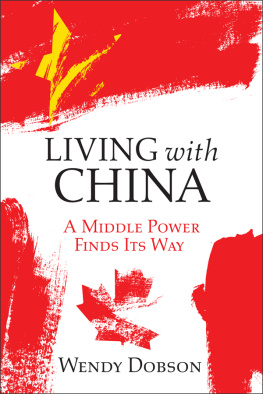MIDDLE POWER, MIDDLE KINGDOM
DAVID MULRONEY
MIDDLE POWER, MIDDLE KINGDOM
WHAT CANADIANS NEED TO KNOW ABOUT CHINA IN THE 21ST CENTURY

For Janet, the ultimate traveller.
Contents
Preface
T his book represents my best effort at facing up to an unpleasant possibility. It began to take shape in my mind about ten years ago, after I was thoroughly rattled by a passage in the opening pages of Whitehall, Peter Hennessys classic account of how government works in Britain. Hennessy explains how the pace of change in society can exceed the ambitions and abilities of well-intentioned public servants. He writes, It is not much fun in your Indian Summer to have to endure well publicised claims ... that you have presided over thirty years of failure and that nothing short of a transfusion of new blood and new methods will suffice if your country is to survive the result of your lifes work.
I retired after more than thirty years feeling profoundly discouraged by what I saw as a steady drift in Canadian foreign policy, most manifest in an inclination to elevate rhetoric and image over strategy and substance, and in a marked preference for seeing the worldand Canada as an actor within itas we want it to be rather than how it is. I could have stayed on, taken another assignment or two after Beijing, and continued to try to make a contribution from within the system. But I felt the need to step out, to find a space where I could think and read and talk to people as I tried to make sense of the direction weve taken and why.
Although I am not about to take sole responsibility for our predicament, I cant entirely absolve myself of all the blame. I was a part of the system, a senior official, developer and implementer of policy, and a briefer of ministers and prime ministers. But as I progressed in my career, gaining experience and expertise, I found that the possibility of shaping policy was actually diminishing as the gulf between the professional, non-partisan public service and our political masters widened, and as the welcome for the public servants contribution of fearless advice and loyal implementation was steadily reduced to just the second half of that pairing. Although much of the blame for this serious systemic failure falls on the master, the servant is also left thinking of opportunities lost, challenges unmet and conflicts avoided. Retirement and reflection dont always contribute to tranquility. The best I can do is offer my own, personal assessment of whats going wrong and what we might do to correct it.
My sense of accountability prompted me to depart from the usual course for public servants in retirement: either remaining faithful to the code of omert, taking not just their secrets but just about everything else they know to the grave, or waiting for twenty-five or thirty years, until what they have to say is solely of historical interest. I wanted to make my case while there is still a chance to change our course. But in doing so, I have done my best to remain faithful to the promises I made when I entered the Canadian Foreign Service in 1981. What were shared with me as official secrets remain secret. I have also protected the private conversations and confidences that are the connecting links between public servants and their political masters.
But I have noticed that, out of a commendable faithfulness to these strictures, and influenced by the tendency to classify everything that happens in government as secret, public servants are increasingly reluctant to share anything about their work. Thats unhealthy and ultimately undermines public awareness and support for the sophisticated balance in government, between those who are elected by Canadians and those who serve as non-partisan professionals, providing both continuity and dispassionate, expert advice. Instead, politicians, regardless of their political persuasion, are now much less squeamish about breaking old conventions relating to where ultimate accountability lies. So public servants, while obligingly silent, are increasingly held responsible for any and all problems. In fact, public service, equated in partisan discourse with lethargy, risk avoidance and self-seeking, is increasingly perceived as the problem.
This silence is having an impact on broader awareness among Canadians about how government functions and just what public servants do. Almost inevitably, at some point during the many talks I have given since retirement about Canadas work in China, an audience member has made the comment that he or she was unaware of all the things foreign service officers do for their fellow citizens. If nothing else, this book gives me a chance to share the story of the Canadian Foreign Service more broadly, to introduce colleagues who are, to borrow the words of Joseph Conrad, worthy of my undying regard.
My own views about China and how to manage our relationship with it have changed over time. While my affection and respect for China and its people remain undiminished, my thinking about the nature of its political system has hardened and darkened over the years. My great fear is that my generally dim view of the latter will be taken as my judgment of the former, too. In this, I subscribe fully to the wise words of that brilliant sinologist Pierre Ryckmans, who, working under his pen name of Simon Leys, wrote, As always, in China, individual thoughtfulness and subtlety victoriously counterbalance the stupidity and obscurantism of the system.
Prologue
I t took only about five minutes for me to walk east from my office at the University of Toronto to that fashionable stretch of Bloor Street where the Montblanc outlet and other high-end stores are located. My mission was simple: I was going to replace a wallet I had given to my wife as a birthday present. Although her tastes are very modest, she prized the wallet for being both elegant and functional, an exotic amid the workaday contents of her purse.
She hadnt had much time to enjoy it. It was stolen from our backpack while we were travelling a few months later. I was the custodian of the backpack and was embarrassed and annoyed. Janet simply wanted her wallet back. The original had been purchased while we were still living in Beijing. I had gone to the Montblanc outlet located in Oriental Plaza, a vast shopping mall that runs along the north side of Changan, the Avenue of Eternal Peace. The mall takes up an entire block, ending at the Wangfujing shopping street just east of Tiananmen Square.
Many people who have visited China are struck by the sheer amount of retail space under construction. Although it is typically assumed that everything in China needs to be built on a bigger scale than anywhere else, the sight of multiple malls going up in the same neighbourhood seems to defy common sense. That suspicion is quickly confirmed by walking through vast complexes housing an array of similarly deserted stores.
What distinguishes Oriental Plaza from many other Beijing malls is the fact that it is usually very busy. In addition to the retail space, it houses office towers and a luxury hotel. Pedestrians often choose its climate-controlled walkways over Changan, which, despite its soothing name, is vast and impersonal at foot level, a traffic-clogged canyon feeding cars into the square that is the very heart of the capital and the country.
I am a terrible shopper and try to get in, make my purchase and get out as quickly as possible. This Beijing Montblanc outlet was ominously busy, but I was served quickly and efficiently, steered through an almost bewildering array of choices to the wallet I thought Janet would like best. My most vivid memory is that the salesperson put on white gloves to show me the wallets. I had never before bought anything that required the donning of white gloves, and I was deeply impressed. It was a done deal.
Next page
